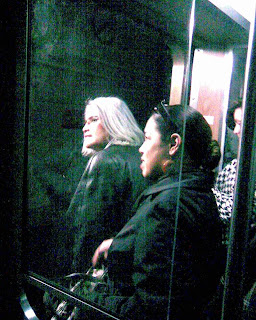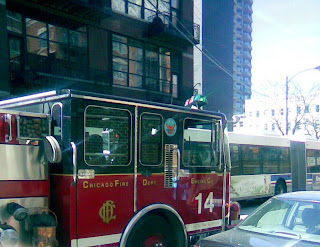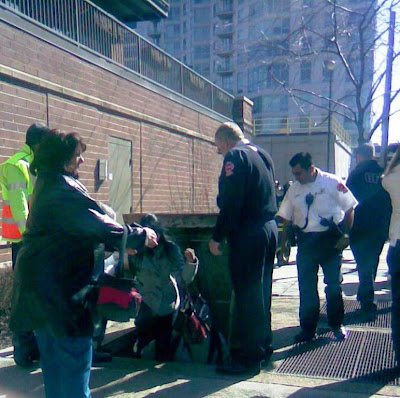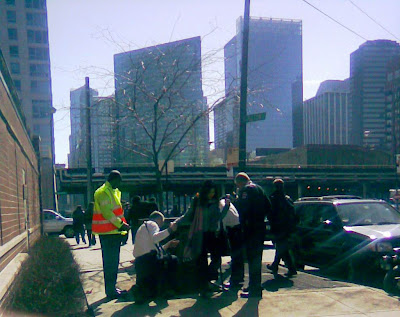Cases, controversies, the occasional water-cooler rant, and news about Cook County judges and judicial elections Feel free to browse here or on page two of this blog.
Friday, April 25, 2008
More on 'jackpot justice' and 'frivolous' lawsuits
I am not now and never have been a card-carrying member of the Illinois Trial Lawyers Association. Although I have worked with and for plaintiff's attorneys on occasion (some of whom were and are ITLA members), for most of my 28 years in practice, I've represented insurance companies -- a type of business particularly unpopular among many judges. So when the Chamber or some other business group claims that some judges are inclined to be unfriendly toward (pick one) doctors, businesses, insurers -- I can't say they're entirely wrong.
It is my belief, however, based on experience, that this results more in differences of approach than outcome. One judge, whom I greatly respect, and who has long since retired, was particularly not fond of insurance companies. I appeared before him many times over the years on contested motions.
Sometimes this judge would come out on the bench smiling and complimentary. He'd make a point of saying, on the record, what a fine brief I'd written, what a good argument I'd made -- and then he'd rule against my insurance company client. But, if he came out on the bench red-faced and irritated -- I had a good chance of prevailing. He might not have liked insurers generally or my clients in particular -- but he would follow the law where it led him and he'd have a reasoned explanation for any decision he made, for my client or against.
Judges who follow the law provide the best defense against real "lawsuit abuse." There can be -- and surely are -- suits that even the staunchest ITLA member would agree are "frivolous." And §§2-615 and 2-619 of the Illinois Code of Civil Procedure provide a quick and relatively easy means of disposing of such suits. If a case is particularly frivolous, judges may award sanctions -- monetary penalties against a party or its lawyer -- under Supreme Court Rule 137.
What non-lawyers should keep in mind in evaluating the "jackpot justice" and "judicial hellhole" claims made by business interests, is that these groups have a more expansive idea of what constitutes a "frivolous" lawsuit than just those which are subject to dismissal on motion. It's not just uninformed or "liberal" judges who let these kinds of "frivolous" suits come to trial: The most rock-ribbed, blue-blooded, conservative judge might also find herself obligated, under the law, to reject a challenge to the legal sufficiency of a certain suit -- but the Chamber would still deem that suit "frivolous." What it comes down to is this: These organizations are really more upset with certain laws themselves, rather than the way judges apply the laws.
Rather than try and construct a theoretical model of the many different kinds of law and precedents that the Chamber and its allies might consider as giving rise to "frivolous" litigation -- an essay that would be boring to read and probably inaccurate to boot -- I will try and illustrate the idea with a specific category of case... in my next post.
Thursday, April 24, 2008
U.S. Chamber decries "jackpot justice" in Illinois
 Rich Miller reports today on claims by the U.S. Chamber of Commerce that "Illinois has one of the five worst legal climates in the nation." The graphic at left was also on the front page of the Capitol Fax Blog today; the copy here isn't actually linked to any site.
Rich Miller reports today on claims by the U.S. Chamber of Commerce that "Illinois has one of the five worst legal climates in the nation." The graphic at left was also on the front page of the Capitol Fax Blog today; the copy here isn't actually linked to any site.But if you were to click on the graphic on Mr. Miller's page (as I did) it would take you to this page, which is the Illinois page of the U.S. Chamber of Commerce report discussed on the Capitol Fax Blog.
The Chamber report quotes Tom Donohue, president and CEO of the U.S. Chamber as saying, "Recent positive rulings by the Illinois Supreme Court and improvements in Madison County courts have been more than cancelled out by growing lawsuit abuse problems in Cook County courts and by a full-scale trial lawyer assault in the state legislature."
The Chamber report appears to be a companion piece for the report put out by the American Tort Reform Foundation toward the end of 2007 labeling Cook County a judicial hellhole. (The link will take you to my December 27, 2007 post on the ATRF report.)
In fact, if you take a few minutes to follow the links, you will see that the reports are very similar. What moved ATRF to declare Cook County a judicial hellhole? If you waded through the excited verbiage, there were three reasons proffered:
- A 2007 amendment to the Wrongful Death Act, 740 ILCS 180/1 et seq. Section 2 of the Act was amended to permit juries in such cases to consider, as elements of damage, the "grief, sorrow, and mental suffering" of "the surviving spouse and next of kin of the deceased person."
- Cook County Circuit Court Judge Diane Joan Larsen's order invalidating "a state legislative limit on potentially infinite pain and suffering awards in medical malpractice cases"; and
- A "Mixed Bag of Excessive Verdicts."
And what does the U.S. Chamber of Commerce offer as reasons for disparaging the court system in the entire State of Illinois? Chief among them:
- According to U.S. Chamber Institute for Legal Reform (ILR) President Lisa Rickard, trial lawyer allies in the state legislature passed a law last year creating a new amorphous category of damages in wrongful death actions likely to lead to much higher lawsuit awards.
- "[L]ast November, a Cook County judge struck down a significant legal reform designed to control runaway awards in medical malpractice lawsuits."
Also cited is pending legislation to revive the Structural Work Act. The original Structural Work Act was repealed on February 14, 1995 by P.A. 89-2 -- but the U.S. Chamber is clearly not saying that the years since 1995 have constituted a Golden Age for Illinois businesses.
I don't mean to be overly basic here, but legislatures enact laws, courts apply the statutes in specific cases. It's not "lawsuit abuse" if a party utilizes a lawfully enacted statute in support of a claim or a defense.
As for Judge Larsen's order on malpractice caps, the Illinois Supreme Court will eventually determine whether she was or was not correct in her analysis. I have not studied Judge Larsen's order and I have no inside information about how it might fare on appeal.
But I do know that a trial judge, like Judge Larsen, is not free to do whatever she pleases in evaluating a challenge to the constitutionality of a statute. She is required to follow the law and apply the precedents of past cases. A prior attempt to impose caps on damages in several kinds of tort cases was declared unconstitutional in Best v. Taylor Machine Works, 179 Ill.2d 367, 689 N.E.2d 1057 (1997). An attempt to impose caps on damages in medical malpractice case was found unconstitutional in Wright v. Central Du Page Hospital Association, 63 Ill.2d 313, 347 N.E.2d 736 (1976).
Is the U.S. Chamber of Commerce (or the ATRF or the ILR) really suggesting that trial judges disregard binding precedents as necessary to promote a particular partisan agenda?
I had thought these chamber of commerce types were sober-sided, gray flannel types. Apparently, however, they're really wild-eyed radicals.
Saturday, April 19, 2008
Nurses try to quit -- and are indicted... along with their lawyer
Click here for the indictment.
I was unable to find the New York State Appellate Division order on Westlaw this evening. For more background about this story, see this February 28 post on ABA Journal.com or this March 23, 2007 article in the North Country Gazette.
Allegedly bright collegians don't Facebook facts
Martha Neil writes about it in an April 18 post on on ABA Journal.com. The post is a follow-up on an article Neil originally posted in July 2007.
In that first post, Neil wrote that university proctors had obtained access to supposedly "private" Facebook pages and were fining students for celebrating exams by "dousing others with champagne, flour and worse." Neil's first article cites Alex Hill, a math and philosophy student at Oxford's St. Hugh's College. Ms. Hill "received an e-mail from Oxford citing her for 'disorderly' conduct after administrators spotted three photographs on her Facebook profile in which she is slathered with shaving cream."
"I don’t know how the proctors got access to it," Neil quotes Hill as saying. "I thought my privacy settings were such that only students could see my pictures."
The Oxford student union got into a lather about "the 'disgraceful' intrusion into" student privacy. It "e-mailed every common room advising how to prevent [Oxford professors from] viewing the photographs."
So.
That was July 2007. These are brilliant students. Did they really figure out how to keep the proctors out of their Facebook pictures? No! And yet, Neil writes, "many haven't been able to resist participating in--and posting online photographs of--excessive celebration of their upcoming graduation."
Thus, according to Neil's article Friday, "the proctors in charge of enforcing Oxford's code of conduct have had a field day fining students for dousing one another with champagne, shaving cream, flour, eggs and worse." University officials have levied "individual fines of between £40 to £500," imposing "penalties totaling more than £10,000--that's almost $20,000 in U.S. dollars, and far more than last year's excessive celebration payday for the university."
You'd think smart kids would know better, wouldn't you? But it isn't just Oxford students who don't understand that, if it's on the Internet, anyone can find it.
---------------------------------------------------------------
Neil's April 18 post cites to this article in the April 17 London Times.
Marked for life by the unauthorized practice of law?
The ad was apparently posted by a 27-year old Chicago woman named Lillian. Above the Law says it was tipped by a University of Chicago law student who, presumably, resisted whatever temptation the ad afforded.
Law students can not practice law in Illinois -- without jeopardizing their future careers -- except under certain limited conditions (specified in Illinois Supreme Court Rule 711).
According to Rule 711(b)(1), law students may, with appropriate supervision, work for "a legal aid bureau, legal assistance program, organization, or clinic chartered by the State of Illinois or approved by a law school approved by the American Bar Association."
Every Chicago law school operates one or clinics which provide services to persons of limited means in a number of legal specialties. For instance:
- The Edwin F. Mandel Legal Aid Clinic of the University of Chicago ("Currently the Clinic has the following projects: Appellate Advocacy, Civil Rights and Police Accountability, Criminal and Juvenile Justice, Employment Discrimination, Immigrant Children's Advocacy, Housing Development, and Mental Health.");
- The Elder Law Clinic of Loyola University of Chicago ("[S]tudents represent clients in elder abuse and adult guardianship cases. Students with fewer than 51 credits can represent clients in social security and medicare/medicaid appeals. In addition to representing individual clients, all Elder Law Clinic students participate in law/system reform projects and public education projects.")
- DePaul University offers The Center for Justice in Capital Cases;
- The Fair Housing Clinic of John Marshall Law School; and
- The Low Income Tax Clinic of the Chicago-Kent College of Law ("[C]ommon issues include proving a taxpayer's entitlement to the Earned Income Tax Credit (including filing status and dependents), establishing status as an Innocent Spouse, substantiating business or personal deductions claimed on tax returns, seeking relief from various civil penalties, and stopping the Internal Revenue Service from seizing a client's wages or other assets.")
Chicago-Kent also offers "fee for service" clinics in the areas of employment discrimination and civil rights, health and disability, immigration, criminal law, and family law. I was unable to find anything on the Kent website, however, that suggests that their family law clinic will accept tattoos in lieu of money.
Thursday, April 17, 2008
Business casual: Contradiction in terms?
Weiss' article cites Neonu Jewell, "an export compliance counsel with Accenture in Chicago. She told the Wall Street Journal that moving from one law firm or company to another can mean a costly new casual wardrobe."
When Jewell worked at a Fortune 500 hospitality company, Weiss writes, "employees got around the ban on denim by wearing sweats." But gym wear wasn't allowed when Jewell moved on "to a Washington law firm that even disapproved of open-toed shoes on summer Fridays. On business casual days at Accenture, Jewell often wears suits or nicely tailored pants and blouses."
The Journal article described in Weiss' article "offered its own business casual advice culled from interviews with wardrobe consultants. They said both women and men shouldn’t stray too far from traditional business attire. Men could go without a tie or could wear dress pants and a blazer instead of a suit. Women could wear pants, blouses with collars and unmatched jackets. Accessories should include well-made shoes and good watches."
That seems reasonably safe. Some years ago, I remember having to go out to the home office of an insurance client for a meeting. I was wearing a suit. My host was wearing a golf shirt and slacks. "I should have told you," he apologized, "we're business casual here every day now."
"That's OK," I improvised. "This is a brown suit. For a lawyer, anything other than a blue or gray suit is business casual."
Tuesday, April 15, 2008
CTA Blue Line makes unplanned stops
It wasn't the only one. I was a passenger on a train which -- according to the motorman -- was two trains behind the stalled one. The train in front of us allegedly tried to push the stopped one... but to no avail. The motorman suggested that we might go back to the station at Grand and Milwaukee and travel to the Loop on the track usually reserved for O'Hare-bound traffic.
But no situation is so bad that it can't be made worse by impatient people: Power was cut on our train -- no lights, no fans -- because people had jumped off another train and were trying to leg it through the tunnel.
 Eventually, this was the course we were all instructed to take.
Eventually, this was the course we were all instructed to take.These are a couple of passengers on my car, gazing rather apprehensively at the catwalk that we were supposed to follow to the nearest emergency exit.
By this time, we had been stuck, virtually in one spot for 90 minutes (the train did move a few yards a couple of different times during this time).
 Once on the catwalk, we stalled again. These two folks got out of the train... but were stuck again, waiting in line.
Once on the catwalk, we stalled again. These two folks got out of the train... but were stuck again, waiting in line.Unable to see ahead of them toward the alleged emergency exit, they may be looking back to see if another alternative were presented there.
 This is the train ahead of us. People walked back from that train to the same exit used by passengers from the train I was on. (I tried to snap a number of pictures while moving carefully toward the emergency exit, but in the gloom, and with the limitations of the camera I was using, not all of the shots came out.)
This is the train ahead of us. People walked back from that train to the same exit used by passengers from the train I was on. (I tried to snap a number of pictures while moving carefully toward the emergency exit, but in the gloom, and with the limitations of the camera I was using, not all of the shots came out.) When finally reached, the emergency exit turned out to be not particularly glamorous.
When finally reached, the emergency exit turned out to be not particularly glamorous.My camera could not quite capture the grunge or the dirt of the place. My trenchcoat, however, did: As I was finally walking to the office, a little after 10:00 a.m., a man approached me on the street and asked me if I knew my coat was covered in dirt. I didn't, I told him, but I was not surprised.

The Fire Department was waiting for us as we emerged from our exit, at Milwaukee and Clinton.
Shuttle buses were also lined up to take passengers to their final destinations.
 After the spiral stairway shown above, there was one final stairway to the street -- more of a ladder, really, and emergency personnel were waiting to help people up to the street.
After the spiral stairway shown above, there was one final stairway to the street -- more of a ladder, really, and emergency personnel were waiting to help people up to the street. Fortunately, this is not a regular occurrence on the CTA.
Fortunately, this is not a regular occurrence on the CTA.The motorman on our train deserves credit for trying to keep the passengers informed: At one point, he told us there were 12 trains backed up behind us, all the way to Jefferson Park. At another he said, "I have 50 people talking all at once on one single channel. I will sort it all out and get back to you in a minute."
While I'm certain there will be stories of passengers becoming hysterical or ill because of the delays, my own observation was that people bore the inconvenience well and with reasonably good humor. Some of that humor faded, perhaps understandably, as passengers stepped in puddles of indeterminate composition at the foot of that spiral staircase leading toward the street.
Update: Going Public, the mass transit blog of Red Eye has this post about this morning's frivolities. There is a sharp division of opinion, obviously, about whether it was appropriate for riders to bolt from the trains without instruction. Apparently the CTA is officially taking the position -- as I'd speculated in the body of this post -- that the persons who left on their own wound up causing the service delays to be longer than they otherwise might have been. Of course, as far as I know, when we were finally instructed to leave the train, the disabled train still had not been moved through the station at Clark and Lake. People seem to have bolted because they received no meaningful information about the status of the problem -- if all the motormen had kept their riders as informed as the motorman on my train, perhaps no one would have bolted at all.
Wednesday, April 09, 2008
Callum and Bryne to leave Appellate Court

 The Supreme Court has announced that Second District Appellate Court Justices Thomas E. Callum (left) and Robert E. Byrne (right) will be retiring from the court effective July 6, 2008.
The Supreme Court has announced that Second District Appellate Court Justices Thomas E. Callum (left) and Robert E. Byrne (right) will be retiring from the court effective July 6, 2008.DuPage County Chief Judge Ann B. Jorgensen has been appointed to the Appellate Court to fill the unexpired term Justice Callum, while DuPage County Circuit Judge Michael J. Burke will serve by appointment in Justice Byrne's stead.
DuPage County Circuit Judge Richard M. Stock, who had been serving by appointment to the vacancy of Judge Edward R. Duncan, Jr., has been appointed to Judge Jorgensen's vacancy. Meanwhile, Associate Judge Blanche Hill Fawell has been appointed to the Duncan vacancy. Fawell is the daughter-in-law of former DuPage County Chief Judge Bruce Fawell and former state Sen. Beverly Fawell (R-Glen Ellyn). Fawell beat Stock for the Duncan vacancy in the February primary; she is unopposed in the November election. Appointing Stock to the Jorgensen vacancy gives him the opportunity to stay on the bench until 2010.
Each of these appointments becomes effective on July 7.
Tuesday, April 08, 2008
Saudi girl killed for chatting on Facebook
A young woman in Riyadh, Saudi Arabia was murdered -- beaten and shot, according to the newspaper article -- by her outraged father because she was chatting with a young man that she met on Facebook. (That last link will take you to the "Arab Media & Society" site linked from the Daily Telegraph website.)
Although I diligently followed the links in the various articles cited, I have yet to see any reference to the father being charged with any sort of a crime.
Saturday, April 05, 2008
Learn English or do time?
The link is to a Chicago Tribune reprint of a Philadelphia Inquirer story by Angela Couloumbis. There were 50 comments posted to the March 28 Tribune story as I began writing this -- a predictable exchange of sniper fire between those who are pro- and anti-immigrant and between people who think that English should be made the official language of the country and those who think people who think that way are necessarily racist reactionaries. One poster seems to want George Bush deported on account of the President's celebrated difficulties with standard syntax.
However amusing these comments may be, I'm more interested in the idea of whether a non-standard condition of probation like that imposed by Judge Olszewski can really, in a proper case, help a young offender get on a productive path. As a civil lawyer, unfamiliar with criminal law, I couldn't put the issues in perspective without doing a little homework. I could only recall one instance where an Illinois judge had a policy of imposing non-standard conditions of probation: It didn't go well for Samuel G. Harrod III, the haircut judge in the 1970's, although the one month suspension imposed on him by the Illinois Courts Commission was ultimately vacated by the Supreme Court. People ex rel. Harrod v. Illinois Courts Commission, 69 Ill.2d 445, 372 N.E.2d 53 (1978).
In doing a little research I learned that §5-6-3 of the Unified Code of Corrections gives a sentencing judge to power, at least in Cook County, to require a person on probation to pursue a high school diploma, GED or a court-approved vocational training program. (See, 730 ILCS 5/5-6-3(a)(7).) I could find nothing in the Illinois statute, though, about requiring a probationer to learn English.
To get some additional context in which to evaluate what Judge Olszewski did, I looked at David Weiss' March 31 column for the Wilkes-Barre Times Leader, "Unusual sentence not judge’s first." Weiss seems to think that the 'learn English' requirement is a natural outgrowth of earlier sentences where Olszewski has required kids to go back to school as a condition of probation. He writes about an early about a sentence Olszewski imposed in 2001:
That’s when he gave eighth-grade dropout Joshua Gyle, then 17, a chance to stay out of jail on a theft charge if he went to go back to school and graduated high school.
If Gyle didn’t make it, that would be a violation of his probation and Olszewski would re-sentence Gyle to prison.
Gyle was thrilled for the chance.
He thanked the judge.
Then he failed miserably.
Two years later, at 19 years old, Gyle appeared before Olszewski, a Luzerne County Court of Common Pleas judge, after getting arrested and failing to go to school.
Olszewski held his promise and sent Gyle to state prison for two and a half to five years.
“I bent over backwards to help you,” an upset Olszewski said at the time. “And you know what you did? You thumbed your nose at me.”
But, Weiss writes, sometimes the sentences have proved successful, too.
Initially, when Olszewski required offenders to get and hold down a job as a condition of probation, he was told that no jobs could be found. So, according to Weiss, Olzewski and a member of his staff, Ron Zukosky, started finding defendants jobs. Weiss writes:
The judge once touted having a 100 percent employment rate.
“The problem here is most criminal defendants that come before me aren’t employed,” he said in a 2004 interview.
Having a job, he has said, allows defendants to gain income and keeps them occupied, preventing them from having time to commit additional crimes.
Finding a probationer a job seems above and beyond the call of duty; it surely is analogous to (and perhaps more helpful in an individual case than) required enrollment in a vocational program. But the additional wrinkle in this case is that the Pennsylvania judge has also imposed a requirement that these particular defendants learn English. The Tribune notes that Judge Olszewski says this requirement wasn't imposed as punishment; it was added so that the defendants could, quoting the judge, "get a better education, [get] a better job. Period."
At least one of the defendants' lawyers didn't seem to be outraged by the language requirement. From the Tribune article:
Ferris Webby, the attorney representing Guzman-Mateo, Thursday called Olszewski's ruling unusual. But he said he believes the judge's directive to learn English was intended to help the men best meet the conditions of their parole, which includes obtaining their GEDs, and staying away from drugs and alcohol.
"He saw how tough it was for them to communicate on a very serious issue in a courtroom on a very serious charge," Webby said.
According to the Tribune article, Webby was concerned about how his client's progress in English will be measured. Will there be a test at the end of the probationary period? What will be on the test? Presumably, and this is strictly my assumption, Judge Olszewski has some sort of conversational ability in mind as a standard. Anything more than that would be unrealistic and unfair.
There are degrees of fluency. Although, as I've mentioned, I don't handle criminal work, in the course of my career I have had many occasions to recommend that witnesses use the services of a translator for court appearances or depositions. I've done this even though, many times, these were people who were capable of conversing comfortably in English. They could ask for and follow directions. They could shop. They could hold down a job. However, as far as I'm concerned, testifying in court or in a deposition requires a greater degree of linguistic precision than polite conversation. A witness who gets counsel's questions translated should be more at ease and less likely to inadvertently say something untrue. (Witnesses have not always heeded my advice -- and translations have sometimes been far from perfect -- but those are war stories for a different day.)
Thursday, April 03, 2008
Con Con gets a big boost from recall vote
Rich Miller's take on the move, linked above, is that the measure may sink without a trace in the State Senate, since that body is under the sway of Blogjevich ally Emil Jones. Other commentators seemed in agreement (this link is to a Prairie State Blue post; there several others I saw but did not link).
Seems to me, though, that voters will vote on the recall amendment anyway this November. Even if it is not on the ballot, Con Con will be. For many, that will be the same thing.
Wednesday, April 02, 2008
Negligent bicyclist not "uninsured motorist"
 The Appellate Court's opinion in Standard Mutual Ins. Co. v. Rogers, 2008 WL 795294 (Ill.App.3d Dist. 3/20/08), does not advise how old the bicyclist was. The case, however, arises from the Circuit Court of Will County -- it may be safe to speculate, therefore, that we are not talking about a bicycle messenger, such as those that careen wildly about Chicago's Loop. Their employers may have some sort of liability coverage. But the bicyclist in that hit Jimmie Rogers' car apparently did not.
The Appellate Court's opinion in Standard Mutual Ins. Co. v. Rogers, 2008 WL 795294 (Ill.App.3d Dist. 3/20/08), does not advise how old the bicyclist was. The case, however, arises from the Circuit Court of Will County -- it may be safe to speculate, therefore, that we are not talking about a bicycle messenger, such as those that careen wildly about Chicago's Loop. Their employers may have some sort of liability coverage. But the bicyclist in that hit Jimmie Rogers' car apparently did not.So Rogers sought recompense from his own auto carrier under his uninsured motorists coverage. By law, every auto policy must uninsured and underinsured motorists' coverage (UM and UIM coverage) in amounts at least equal to the liability minimums required by law ($20,000 per person, $40,000 per occurrence, $15,000 property damage -- see §7-203 of the Illinois Motor Vehicle Code).
But did UM coverage apply in Rogers' case? That was the question that Rogers' carrier, Standard Mutual, asked by way of a declaratory judgment action. Will County Circuit Court Judge Barbara Petrungaro held that it did not; the Appellate Court agreed. The unanimous opinion, by Justice Mary W. McDade, looked at the text of the Illinois Insurance Code provision that mandates UM coverage, §143(a) (215 ILCS 5/143(a)). The court emphasized that the statute requires that coverage be provided "for the protection of persons insured thereunder who are legally entitled to recover damages from owners or operators of uninsured motor vehicles." (Slip op. at p. 4, emphasis in original.)
The Insurance Code does not define "motor vehicle" -- but the Vehicle Code does. Justice McDade's opinion cites §1-146 of the Vehicle Code, which defines "'motor vehicle' as '[e]very vehicle which is self-propelled and every vehicle which is propelled by electric power obtained from overhead trolley wires, but not operated upon rails, except for vehicles moved solely by human power and motorized wheelchairs.'" (Slip op. at p. 5, emphasis in original.) The court also examined the Vehicle Code definitions of "vehicle" and "bicycle."
In light of these statutory definitions, the court concluded "it is clear that a 'bicycle' cannot be considered a 'motor vehicle' for the purposes of the uninsured motor vehicle coverage." Rogers could not collect on his UM claim for the bicycle collision.
------------------------------------------------------------------
Illustration obtained from this site.
Walking and chewing gum ban next?
Dunkin's bill would make it a petty offense (punishable by a fine of up to $25) for a pedestrian to use a wireless telephone "while crossing a roadway."
The article posted on the Newsradio 780 Website suggests that Illinois Secretary of State Jesse White takes also takes credit for the idea.
Apparently the concern is that distracted pedestrians may wander into the street without looking -- but, surprisingly, given that concern, arguing with a fellow pedestrian, listening to music on headphones, or thinking about what's on the afternoon schedule aren't included on the list of activities to be proscribed while crossing the street.
Yet.